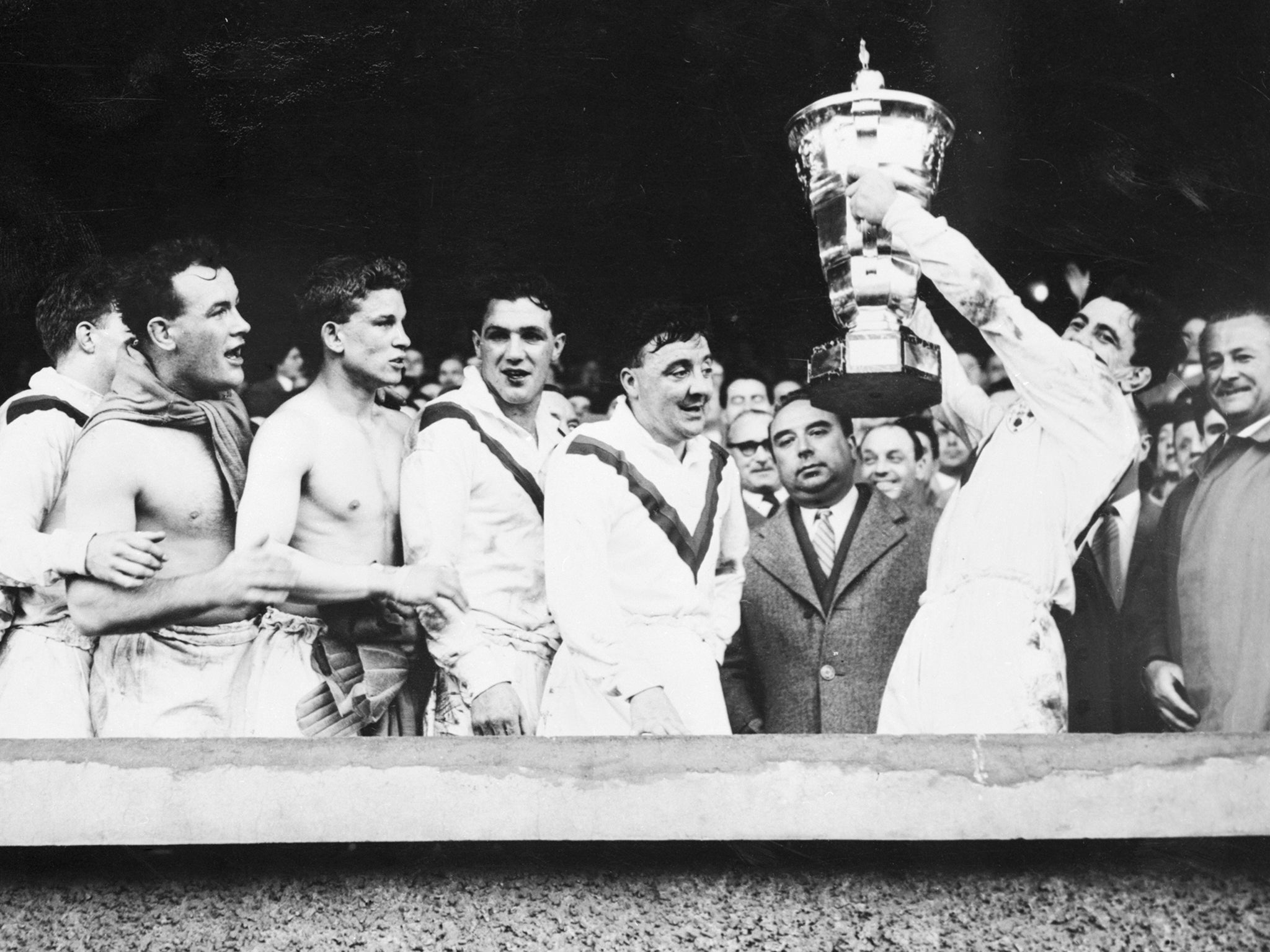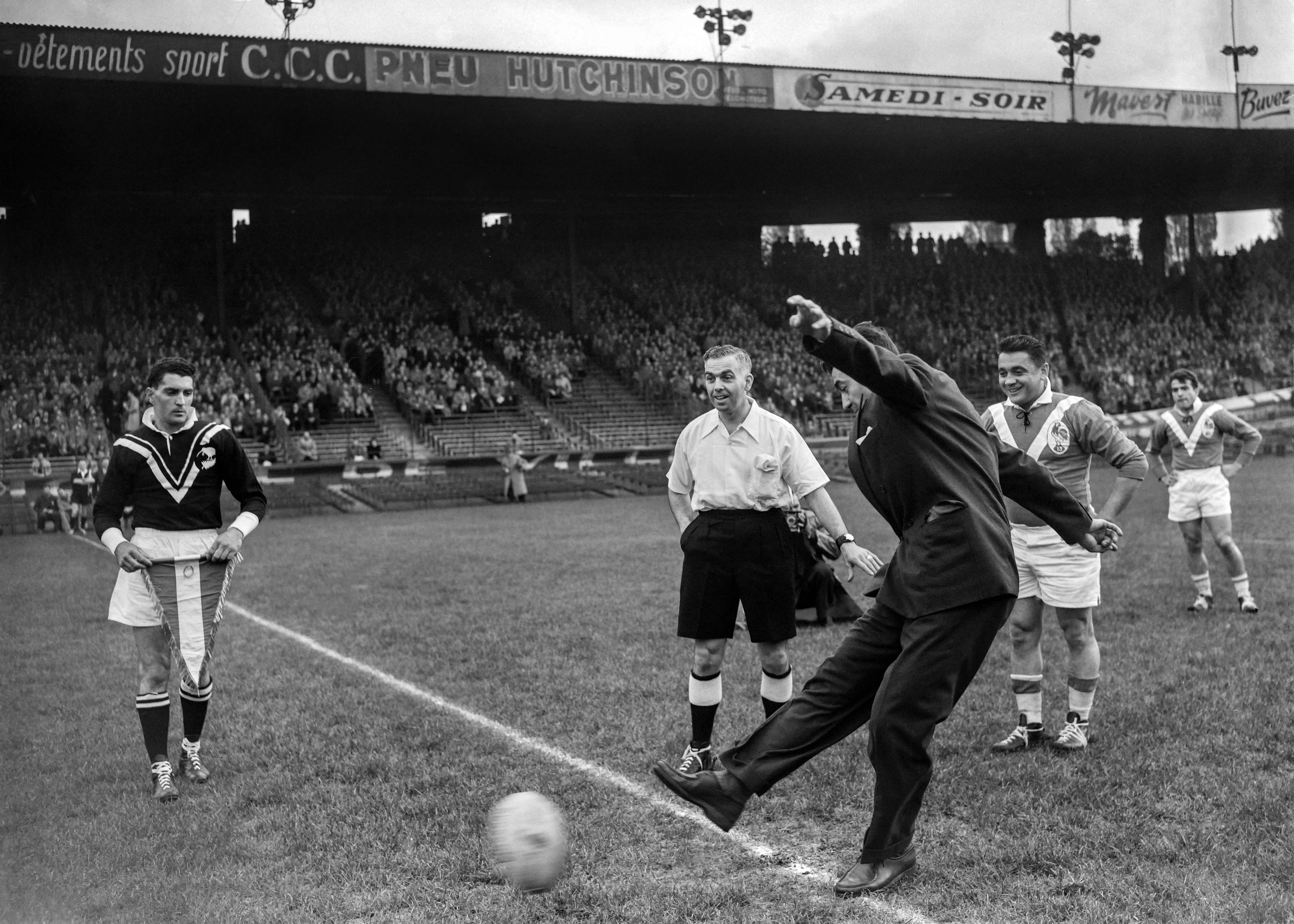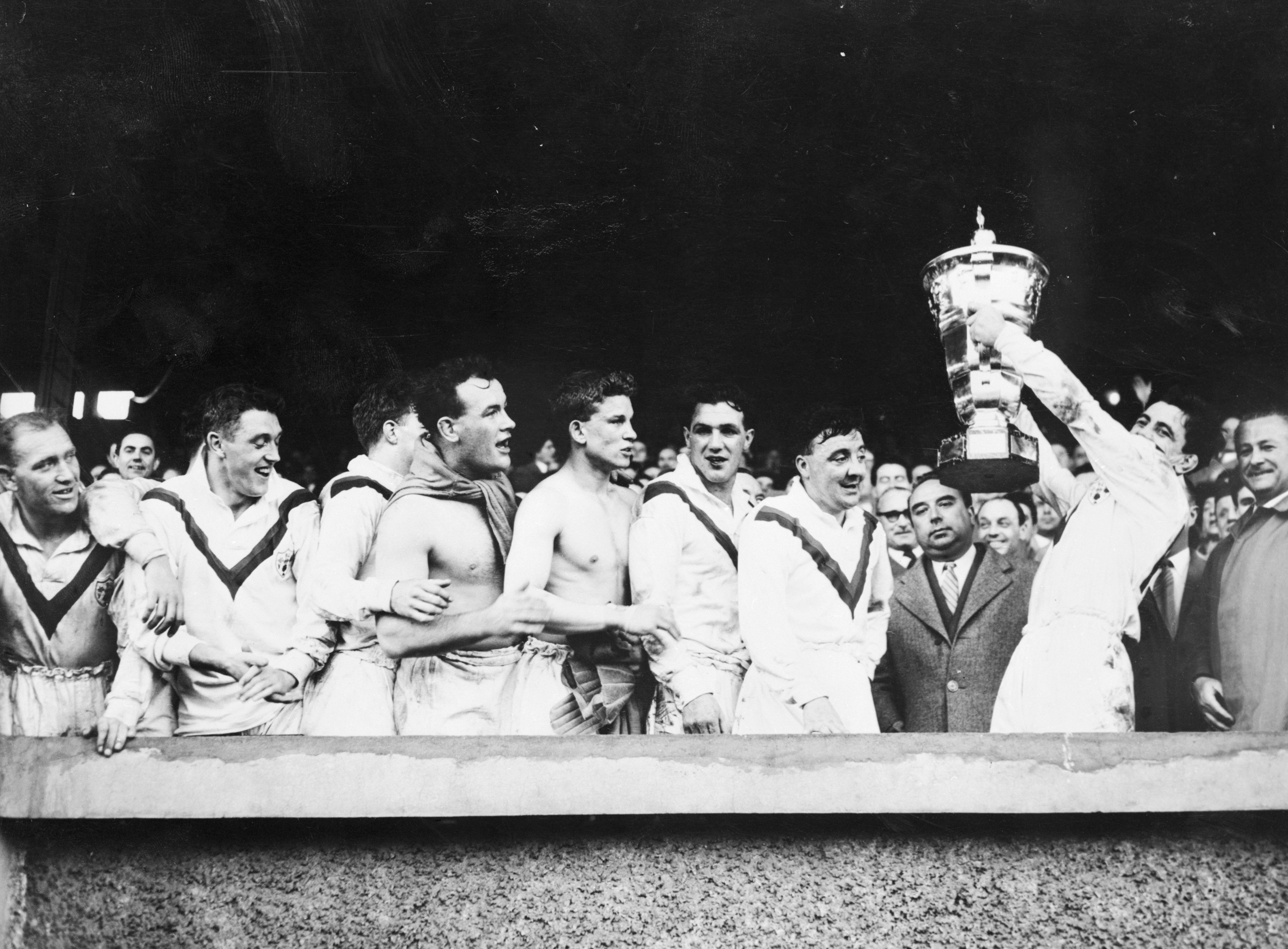The against the odds story of the first Rugby League World Cup
When England kick off the 16th iteration of the tournament on Saturday, they would do well to remember the remarkable story of how the very first one came to be, writes Mick O’Hare


Rugby League’s men’s World Cup kicks off on Saturday when England take on Samoa in Newcastle. It’s the 16th iteration of a tournament first played in France in 1954. But, if 10 years previously, you’d asked any French player taking part in that inaugural competition whether they’d ever foresee playing a World Cup on home soil they’d have laughed (or more likely wept) in your face. And that’s because in 1944, in Nazi-controlled France, rugby league was illegal. But why? It seems a preposterous notion today. Who would outlaw an entire sport, and on what possible basis?
The two codes of rugby – league and union – have long had a fractious relationship first forged in August 1895 when a group of clubs in northern England demanding they be allowed to pay their players for missing work shifts split from the strictly amateur Rugby Football Union (RFU) in London. And while détente, even grudging acknowledgement, now exists between the two since unions joined league in becoming professional three decades ago, some wounds run deep. And nowhere deeper than in France. It is often said that watching French rugby league (or rugby a treize) is as much a political statement as it is a sporting one.
The first rugby league match played in France was an exhibition game between England and Australia in Paris in 1933. Until that point all rugby clubs in France had been playing rugby union. Ten thousand spectators turned up, among them Jean Galia, a player with the Villeneuve club. He liked what he saw and gathered together a team of players who 10 weeks later arrived in England to play their first matches of rugby league.
The French sporting public also liked what they saw. French rugby had always been a free-running, passing game and rugby league’s rules encouraged this. The sport also had that whiff of rebellion about it, attracting support in a country that was rapidly changing politically. In 1936 elections had returned the Popular Front – consisting of socialist and liberal parties – and a rejection of what was seen as the elite was underway. Rugby league, a sport born of defiance, arrived at the right time. It appealed to a working class who believed they should be paid for their sporting talents much like footballers and boxers. And, with the Spanish Civil War raging just across the border, rugby – very popular in the Catalan and Basque communities of southern France – also underwent a revolution. Catalan and Basque clubs began to switch rugby codes with league being deemed the game of the emancipated.
When it was formed in 1934 the Ligue Francaise de Rugby a Treize had 29 clubs. By 1938 it had 225. Journalist Henri Garcia wrote that rugby in France was like “a funicular railway, as rugby league went up one side, rugby union went down the other.” Rugby union was shedding teams and players.
But then came the Second World War, and France’s Nazi puppet state of Vichy. This German-backed government, stacked with former rugby union figures and beholden to the establishment, took its revenge. Under the pretext of reasserting “traditional values” rugby league was deemed likely to contaminate the nation’s youth and declared “morally decrepit”, associated as it was with separatists and the political left. Its assets were seized and its offices destroyed. Sports historian Tony Collins, emeritus professor of social history at De Montfort University, wrote in his book The Oval World: “Vichy’s settling of scores with rugby league was not just ideological, it was personal.”
Marshal Petain, the collaborationist leader of the Vichy government, signed the decree proscribing rugby league on 19 December 1941, the first and only sport anywhere to be banned. “It was just a game,” said the pre-war president of the French Rugby League, Marcel Laborde. “Why did they hate us so much?”
In the years since the war, the organisation Treize Actif has lobbied the French government for reparations, but to no avail. It’s spokesperson Robert Fassolette says: “An apology would be worth more than the money today”.
But out of the anger, the hopelessness and the rancour of the Vichy years, it was that wartime experience which led pretty much directly to the first Rugby League World Cup.
Paul Barriere, a young resistance fighter from the Aude, became the post-war president of the French Rugby League. He had played rugby union before the war but, having witnessed Vichy’s treatment of rugby league, switched codes. He immediately lobbied the new government in Paris for the reinstatement of rugby league but was rebuffed. The ministry of sport was still stacked with members of the pre-war rugby union-supporting establishment. But with the weight of public opinion stacked behind those deemed to have suffered under Vichy, Barriere switched tactics and instead approached the Ministry of Justice who overruled the sports ministry. Even then rugby league remained banned in schools and, until the early 21st century, officially had to use the simplistic moniker jeu a treize or “game of thirteen”.
Despite the reinstatement, Barriere realised that if his sport was to thrive in France, against seemingly insurmountable odds, it needed an international dimension. It had thrived before the war because it was seen as “neo rugby” in a changing political climate. At the same time the French rugby union team had been barred from international competition for being considered “too violent”. If league could be seen as the game mirroring the new spirit of optimistic, liberal internationalism sweeping Europe after the ravages of war, it could attract a youthful audience no longer hidebound by the continent’s past. In early 1954 Barriere proposed a World Cup tournament in France along the lines of football’s which had first been played in Uruguay in 1930 and had led to a global explosion in the sport’s popularity.
But he hadn’t factored in the reluctance of his English-speaking counterparts. As with their football-playing compatriots who refused to take part in their World Cup until 1950, believing the Home International Championship between the nations of the UK was eminently superior, the British Rugby Football League was indifferent. They believed their biennial series against Australia was paramount. Meanwhile Australia and New Zealand thought the competition would rack up a huge loss and refused to travel.
But Barriere could see beyond the insular and self-serving. He invited the USA, Italy and Yugoslavia (all believed they weren’t up to standard so refused) and offered to pay the airfares of the Kangaroos and the Kiwis. Urged on by their European neighbours, desperate to persuade them of the value of an international tournament, the British were forced to capitulate, although the £25,000 offered to each participating nation was probably the deciding factor. Although only four teams would take part, the World Cup was on.

Even so the British remained unenthusiastic participants in that first tournament played in October and November 1954. The Lions had just returned from Australia and New Zealand and many of the touring party made themselves unavailable, either through indifference or being unable to take more time off work. They would rue their decision.
Only three of the 26 players who had toured the Antipodes headed to France: Phil Jackson of Barrow, Gerry Helme of Warrington and Scottish-born Huddersfield player Dave Valentine who was made captain. The remainder were second-string players who were offered a mere £25 for three weeks away from home. They were branded “no hopers” by the British press.
Keen to reduce outlay the Rugby Football League (RFL) hired a bus to drive the team (and accompanying journalists) to venues around France. The players sometimes slept aboard to keep hotel costs down. British coach Joe Egan was asked to stay at home and, even more astonishingly, no rugby balls went with the squad – they practised at first with clothing tied up in string until the French organisers took pity.
Second-row forward Basil Watts said later: “We didn’t play for the money, obviously, but when we realised Joe wasn’t coming with us, we had that as an incentive. To bring back the trophy for him.” Valentine took on the coaching duties, stopping off at public sports fields to work out tactics and plan moves.
The team travelled far and wide. The organisers had intended to spread the sport’s gospel and the schedule was suitably challenging. Great Britain played Australia in Lyon on 31 October and New Zealand in Bordeaux on 11 November. And, to the surprise of pretty much everybody, they won both with ease. Sandwiched between was a match against the hosts in Toulouse. It was a brutal, combative game in front of 37,471 spectators and ended in a 13-13 draw. Against all expectations Great Britain topped the round-robin table alongside France. The two would meet in the final at the Parc des Princes in Paris.
“We really couldn’t believe we made it,” said Valentine. “Maybe it was because there was no weight of expectation on us, we could play freely.” On 13 November, only two days after both teams had played their last qualifying match, a packed stadium saw a tense final that see-sawed either way but, despite a valiant French fightback late in the game, stand-off Gordon Brown’s second try of the match was enough for Great Britain to prevail 16-12. It had been a monumental triumph for a team written off by everyone. As journalist Alfred Drewry wrote: “There is no spectacle in sport more stirring than that of a team accomplishing more than theoretically it should be capable of.”

The match had been televised in the UK allowing millions of new TV owners who had bought sets the previous year to watch the coronation of Elizabeth II to witness the first British team in any sport to be crowned winners of a World Cup.
And as Barriere and the French organisers predicted, the tournament was a huge success, attracting large crowds which easily covered its costs and delivered a profit for the Rugby League International Board. All of a sudden the once-disinclined English-speaking nations wanted to host a World Cup and the next competition was quickly scheduled for Australia in 1957. Barriere was vindicated. “Prejudice, spite and hateful politics, couldn’t kill off rugby league in France,” says Mike Rylance author of the eponymously titled book The Forbidden Game. “Instead they galvanised it.”
This year’s men’s competition will be the biggest ever staged – 32 teams attempted to qualify. Also being played simultaneously are the sixth women’s World Cup, the fourth wheelchair World Cup and the first physical disability World Cup.
The men’s trophy is now named in Paul Barriere’s honour. Maybe the captain of the winning team lifting it at Old Trafford on 19 November will be aware of who came before him. But it has been 68 long years since Dave Valentine passed into rugby league folklore as the underdog captain who defied the odds at that very first World Cup. And, more pertinently, it has been 68 years since the vision of a man driven by what he witnessed during the Second World War came to fruition.
Rugby league’s players and personalities do not often experience the level of fame accorded other sports. Bobby Moore and Jules Rimet will forever outshine Dave Valentine and Paul Barriere but it would be timely if, for one day in November, both of them finally received brief but due acknowledgement of what they achieved.
Join our commenting forum
Join thought-provoking conversations, follow other Independent readers and see their replies
Comments



Bookmark popover
Removed from bookmarks